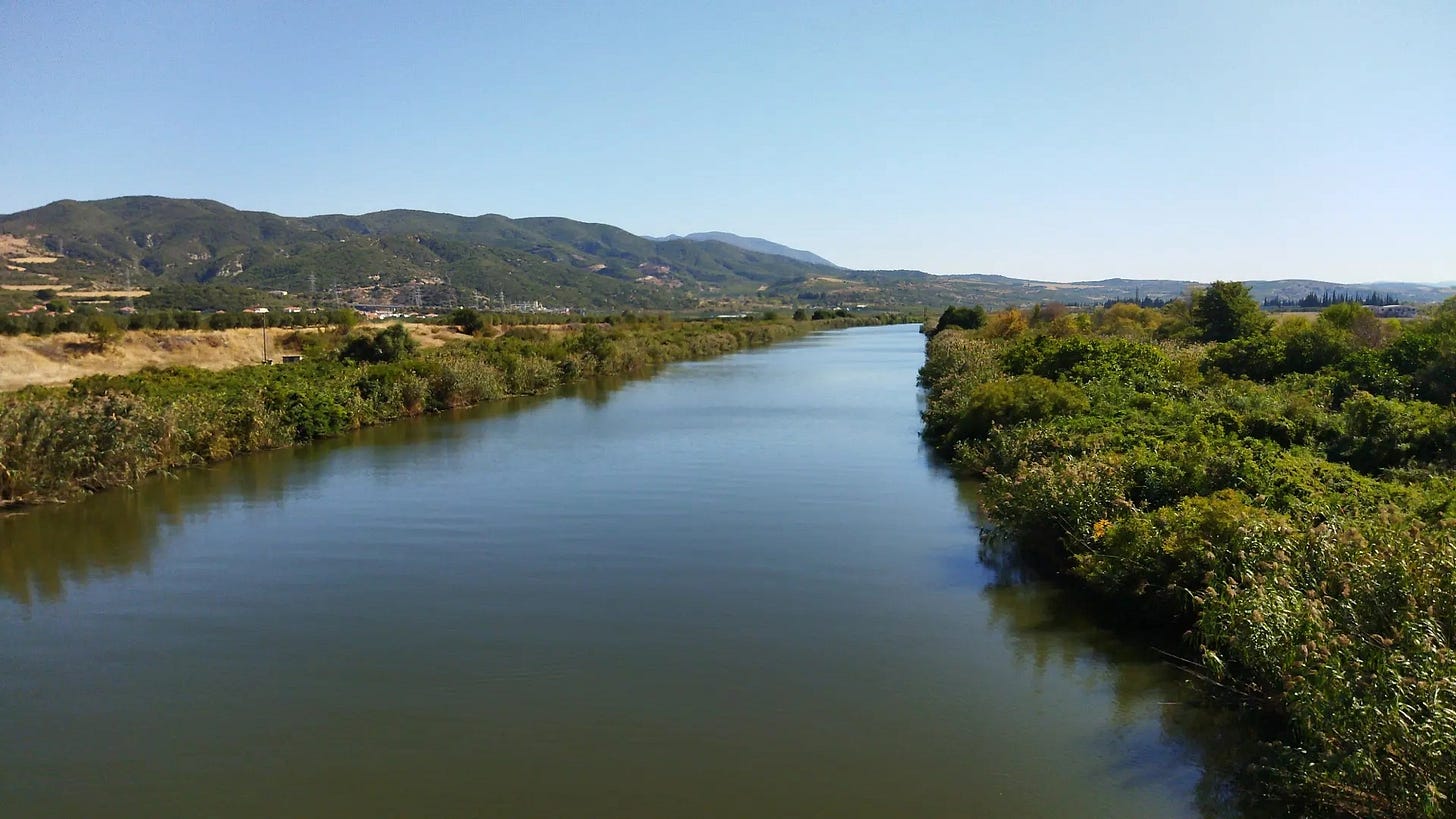(picture by Stability AI)
This week’s Wealthgiver post goes out to
, who asked Substack for more etymology. I’m doing my small part, Victor, to gratify your philologia.Last week we ended with tsi dass? “What are you doing?” The root of dass is *dʰeh₁-, ancestor of English “did” as well as the “-ed” past tense ending of weak verbs, Greek theós, and Latin fēstus. Moving on, the old man answers the question.
Zélta pe ssagát. Ssagáss, pagáss, praskágass. Ádass na vu íta.
Gold for the sack. The sack, the speech, the ambush. We can see Hades.
Hades (*n̥-weyd-éh₂s “The Unseen One”) carries a sack of plenty - plossák - from Greek sákkos, itself a loan from Phoenician or some other Semitic language. The rest of the old man’s response is mostly babble, but you’ll be amused at the etymology of praskák: a jump-from-around, an ambush.
Now for the good stuff.
The story of Wealthgiver calls for prophesies given in verse, not in the modern Bessian language, but in Thracian, Bessian’s Classical-Era ancestor. I should note here that although Thracian was a real language, almost no examples of it survive. Unless I tell you otherwise, assume that the following is my invention. It’s a reconstruction of what Thracian might have been, and certainly falls short of the real thing.
Here’s the whole prophesy:
Kōgaió io
pódes xénai. Dymó
Dóubous tous me
Iérous phlēsté.
Porostrebýn ápaes
Iaes se rhódaes
Tous strátous pephlón
Se iēn sḗlkont.
Tēpsáte pós se iá
Stas zýn tēpsánia.
Gríssma tón
An xenón
Ke abdésyme zeltón.
Pronounce each vowel with one beat. Long vowels get two beats.
What does that all mean? Let’s look at the first verse:
Kōgaió io pódes xénai.
Foreign feet to the Holy One.
Here, although the prophetess doesn’t say the word the word orós “Mountain,” everyone knows that she’s referring to Kōgaiós ios Orós, the Holy Mountain, which in my novel is the last hiding place of the Bessians and their religion. This fictional mountain is based on a real one, a mountain named Kōgaionon by Strabo, supposedly the final resting place of Zalmoxis. The real Kōgaionon would have been in modern Romania, possibly Mount Gugu.
The Greek word xénos (guest, stranger, foreigner) is of uncertain origin, but it might be related to *gʰes-, the origin English “guest.”
Dymó Dóubous tous me Iérous phlēsté.
You will fill the Sacred Depths with Smoke.
The Sacred Depths refers to the interior of the mountain. Literal smoke - dymós - is a problem for people who live in poorly-ventilated cave systems. “Smoke” is also a metaphor for pride, indignation, and shame, as with the Greek cognate thymos. English gets “fume” from the same source (by way of Latin and French), as well as “dew” and “down” and, I think, “dim.”
Porostrebýn ápaes iaes se rhódaes tous strátous pephlón se iēn sḗlkont.
The red waters stream here, around the soldiers who tug her robe.
In porostrebýn (“they stream around”) we find my favorite Thracian etymology. This is a real one: the name of the river Struma. The Struma flows from Bulgaria into the Aegean through Greece, and its ancient name was Strumṓn, from a Thracian word related to English “stream,” “rheum,” “serum,” and “rhythm.”
The prophesy references another real etymology: that of the Rhodope Mountains. Rhodā́ Apā́ - Red Water. The second word refers to living, active water, *h₂ép-, the source of the first element of Celtic river names like Avon and Afton and possibly the word “ape.” The big, tailless monkeys were named after river-spirits from Germanic folklore.
Tēpsáte pós se iá stas zýn tēpsánia.
The Mistress will stand with the Master behind her.
Tēpsátis and tēpsánia are the (fictional) cognates of Greek Despot and Despoina, epithets of Hades and Persephone. Both words are from the PIE *dems potis, or “master of the house.” That *potis also gave us the name of Poseidon (“Master of the Earth” from before he was a sea-god) and, through Latin, words like “potential,” “potency.”
Gríssma tón an xenón ke abdésyme zeltón.
If only I were to take in the foreign favor and gold.
I’ve talked before about the verb dísam (ancient désam), which I usually translate as “receive,” but could as well be “take” or “welcome.” The important word here, though, is gríssma, which means favor or debt - something bestowed that the recipient did not pay for. It’s from the root *ǵʰer-, the origin of “charisma.”
None of the translations I gave done rhyme or scan like the original. To give you a taste of what the prophesy sounds like to its listeners and speaker, here it is in verse:
On Holy Mountain, foreign feet.
You make Sacred Depths with smoke replete.
Rivers ruddy stream around
the armies tugging at her gown.
With Master at hand
The Mistress will stand.
If foreign debt
With welcome’s met.
How will the Priests of Hades react to this revolutionary oracle? Subscribe and find out next week.







I was a bit delayed getting to this due to some international travel, but I think you are doing some great work here. Thanks for tagging me!